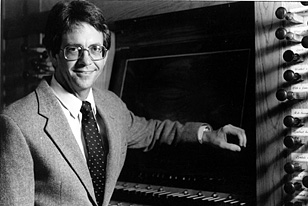Marion R. Anderson
Tribute to retiring faculty member Marion R. Anderson, professor of music, by his colleague James P. Parakilas, James L. Moody Jr. Family Professor of Music

When Marion Anderson came north from South Carolina and Florida, via Amsterdam, to begin his graduate work at Yale, he probably didn’t expect that he would keep moving north and spend his career in northern New England. But having found himself unexpectedly in Maine, he apparently decided he could expect the unexpected from others. As a Southern gardener, for instance, he would expect okra plants to grow in Maine, and year after year they, no doubt to their own great surprise, produce their pale tropical flowers and succulent pods for him in the brisk Maine summer.
Marion has always treated his students at Bates more or less like his okra plants. They’ve never sung before? Fine, he’ll say, sing a cappella, dodecaphonic Stravinsky — and love it. They do. Hate opera? Fine, listen to Wozzeck. Don’t just listen to it; don’t just watch it; open the score and figure out how Berg has put the music together and then watch and listen again. Under the irresistible sunburst of his enthusiasm, their enthusiasm blooms. They never forget their musical conversions at his hands.
For a generation of Bates students, musical life here began at Convocation, watching and listening as Marion conducted whatever chorus of elder students he could coax together for the occasion. Musical life might go on to mean singing Bach or Byrd in his College choir, his chamber singers, his Chapel singers. It might mean hearing him play Couperin or Bach on the harpsichord, Messiaen or Bach on the glorious Helmut Wolf organ he persuaded the College to have built in the Chapel. It might mean learning how Cage goes/doesn’t go with Cunningham in his first-year seminar on music and dance. Students who study music theory here have been likely to meet Marion at the beginning of that road and again in the final semester of it.
That road is here because he laid it out and paved it. President Reynolds hired him in 1969 to accompany the College choir, but more importantly to begin the creation of a music department. Back then, when he was fighting against considerable resistance to get a single course in music theory approved, Marion would not have expected one day to see a full-fledged theory program here, or a choice of two professional composers for students to study with, or lessons being given on instruments from banjo to sitar, or a steel pan ensemble fighting with a Javanese gamelan for rehearsal space in a magnificent if overcrowded arts center. But then, neither did he ever expect, I’m sure, to become the chair of the Curriculum and Calendar Committee and sit in judgment on other people’s improbable projects.
I doubt Marion ever expected to conduct the Bates orchestra. But when the need arose, he got those okra plants to bloom too. He never expected — and certainly never wanted — to become chair of the music department. Like the rest of us, he was happy to leave that in Ann Scott’s capable and willing hands. But in the last two years the College has needed him to be the chair, and he has done more than swallow his reluctance and keep things running. He has taken on whatever wasn’t working and made it better.
Above all, at a time of tremendous change in the history of this department, he has considered what the study of music should mean now for this college and its students, and he has set on our departmental stove a gumbo in which his favorite old musical okra will swim happily with a lot of ingredients he never expected to be championing just a few years ago.
Everyone at the College can join his music department colleagues in thanking Marion for the music he has brought into our lives, for the respect and devotion he has unfailingly shown to both students and colleagues, and for the wisdom with which he has served the department and the College in the brief Maine summer of his 35 years here.